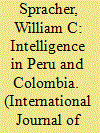| Srl | Item |
| 1 |
ID:
060693


|
|
|
| 2 |
ID:
153160


|
|
|
|
|
| Summary/Abstract |
As the influence the United States wields over its fellow nations in the Western Hemisphere seems to have waned over time, especially in terms of quantifiable military aid and other forms of security assistance, qualitative cooperation in other sectors such as intelligence support has risen in importance. The Cold War having come to an end a quarter century ago, and the long-standing struggle against international Communism ceasing to be a rational justification for dedicated U.S. efforts for remaining close to its allies in the region, other motives gradually emerged, to include cooperation in counterterrorism and counternarcotics.
|
|
|
|
|
|
|
|
|
|
|
|
|
|
|
|
| 3 |
ID:
151109


|
|
|
|
|
| Summary/Abstract |
Founded in 1962, the National Intelligence University has evolved over more than five decades into living up to its current vision as ‘The Center of Academic Life for the Intelligence Community.’ With the intelligence reforms post-9/11 and the development of the NIU concept, the mission has changed from a military-centric focus of instruction to educating a more diverse audience from throughout the IC, both military and civilian, full-time and part-time, active and Reserves, with an emphasis on taking higher education to an interagency clientele spread globally and desiring different learning outcomes. The result is a rapid growth in offsite academic centers and a resurgence of certificate programs geared to professionals who already have a degree but wish to enhance their credentials in intelligence specialty fields. There is also an effort to revive concentrations and programs of study. This article outlines the steps NIU is taking to make itself more flexible and marketable to a growing and demanding academic audience that is much more than the uniformed DoD students who matriculated in the past with full-time resident study as their only option.
|
|
|
|
|
|
|
|
|
|
|
|
|
|
|
|